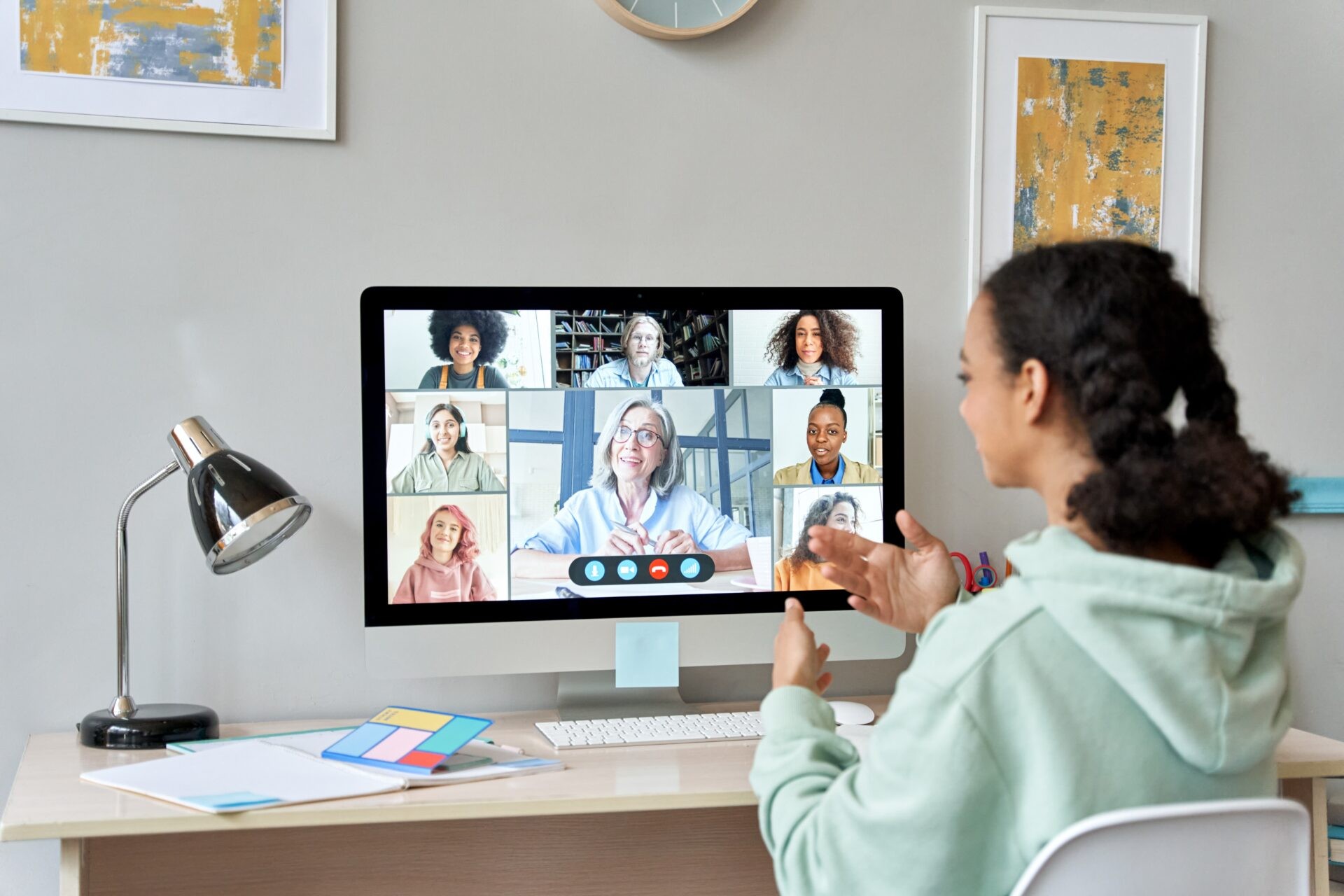Virtual Mentoring is becoming more frequent in our modern environment. Why should you choose this form? Does it really work? Find out in the following article. You will know how to plan an effective Virtual mentorship and support tools.
What is Virtual Mentoring?

When a mentoring session is conducted virtually, such as through a phone call or video conference, it is not done in person. With the advancement of technology, this type of mentorship is now possible thanks to a variety of communication methods including Skype, the phone, email, and texting.
According to research conducted by Marianna Tu and Michael Li, virtual mentoring helps to minimize the prejudice associated with in-person mentoring. In-person coaching may not always allow for flexibility.
Furthermore, the Department of Education at the University of Connecticut believes that virtual mentoring may be utilized to improve student performance.
Read more: What Is An HRIS?
Virtual mentoring Vs Face to face mentoring
Virtual mentoring | Face to face mentoring |
|
|
Benefits of Virtual Mentoring

Reduce the cost
Mentoring someone virtually eliminates the cost of travel to meetings and other other expenditures. Some employers, for example, give a stipend for food and beverages during mentorship meetings. Online meetings offer a way to prevent this, though.
Flexible
Participants in mentoring programs may have meetings whenever it is convenient for them, from any location in the globe, thanks to the different online work tools that are readily available.
There are no restrictions on a particular weekday or hour, and they are not tied to a certain type of meeting environment.
A 45-minute phone conversation from home saves significantly more time than meeting a mentor for coffee throughout the working day.
Solves Traditional Issues
Although the nature of the products may have changed, the obstacles on the road to company ownership remain the same as decades before.
Consulting with a business mentor may be a useful approach to acquire tried and true ways for overcoming these typical hurdles of becoming an entrepreneur.
It's simple to become mentally preoccupied. A business mentor serves as a sounding board for suggestions, questions, worries, and worries, which may help you break out of a rut and obtain a new perspective.
Build and increase relationships
A secluded environment provides a haven for individuals, fostering exceptional connections that emphasize honesty and trust. This fosters genuine connections between mentors and mentees, fostering open communication and the development of mutual trust.
Setup is simple
Unlike huge mentoring programs within organizations, which typically need extensive spreadsheets and lengthy meetings, virtual mentoring is significantly easier to implement. This saves you considerable time with the same effect.
Less social and behavioral pressure
Meeting in person with a mentor or mentee can be challenging for some people for a variety of reasons, including anxieties, anxiety, or poor self-esteem.
Virtual mentorship may really be a far more convenient solution since social pressure is removed, enabling individuals to concentrate more on what is being said than on factors such as body language and facial contact.
Greater Mentor Accessibility
Virtual mentoring offers the ease and flexibility of having access to a large network of mentors for your learning and growth.
Additionally, it motivates additional mentors to enroll in business mentoring programs.
They have more control over time management thanks to a virtual coaching program. It enables them to establish connections with mentees from other industries, particularly those from disadvantaged groups who may not join up for a conventional mentoring program.
Can connect in asynchronous fashion
Virtual mentorship allows individuals to communicate and interact in a variety of ways. Furthermore, all participants do not need to be online at the same moment to participate in the program. It provides asynchronous communication channels, giving everyone enough time to think about their queries and replies.
Read more: Best Requirements Management Tools & Softwares
Challenges of mentoring virtually

Communication difficulties
The use of body language and facial emotions as communication indicators is limited in virtual communication. This is particularly true for communication channels like email and phone conversations.
By using video chat as much as feasible, your mentors and mentees can get through these communication barriers. They will be able to observe each other's body language and facial emotions as a result. It will also codify the program, ensuring that it is taken seriously.
Zones of time
Time zones could be a problem if your mentees and mentors are spread out across different regions.
To solve time zone issues, your program administrators can assist participants in negotiating meeting hours. To optimize the association, useful times may be selected with a little assistance. Even those who are the farthest away can attest to this.
Concerns about technology
Making sure you have the necessary tools is one of the difficulties of coaching someone digitally. It might be difficult to connect if your organization lacks the appropriate mentorship platform or conferencing technologies. To address this issue, you should manage your connection using an effective mentorship platform.
Virtual mentorship program best practices

Make a plan and be prepared
Make a strategy for the topics you and your mentee will address before your voice or video conversation. Make a list of inquiries you wish to make to your mentor or mentee.
You might wish to perform some research as a mentor to offer ideas on how your mentee might accomplish their objectives. Additionally, it's critical to maintain flexibility and be open to discussing topics that aren't on the agenda.
Establishing SMART objectives
Setting SMART goals can guarantee that mentors and mentees have a well-defined route ahead of them.
These objectives can then be the focus of your mentoring activities and meetings. Every few sessions, it's crucial to review these objectives since your mentee could have accomplished one of them or wish to reorder them.
Connect regularly
It is critical to be connected and available. Create a dependable timetable that enables regular, convenient communication between you and your mentee. Pick a strategy that benefits you both, but strive to remain adaptable.
Maintain your concentration
Virtual mentorship can only be successful if both sides are invested. As a result, it is critical to exhibit your interest and dedication.
Stay attentive when engaging with your mentee, whether it's by video conference, phone conversation, video to mp4 conversion, or email.
Reduce distractions and interruptions during the call by practicing active listening. You two can get more connected and trusting as a result of this.
Be open-minded and adaptable
As a mentor, you must transmit expertise and advise to your mentees. Sometimes, though, you could also pick up something from them.
You could come up with fresh, original ideas to bridge the generational divide or promote DEI if you keep an open mind to what mentees have to say, like with reverse mentoring.
Provide candid and actionable comments
Giving advise and direction to your mentee is one of the most crucial components of being a mentor. While some may be inclined to provide philosophical wisdom, honest comments and tangible initiatives will be more beneficial to your mentees.
Request feedback
Ask for comments on your performance as a mentor in the spirit of growth and learning. How have they used your suggestions? You must be able to communicate, respond, and be reached. And so forth.
You can only succeed as a mentor if your mentee provides you with useful feedback that you can use.
Be considerate of each other's time
Be mindful of each other's schedules because you and your mentee can be in different time zones. Additionally, avoid often canceling or rescheduling visits as this might interrupt the mentorship's flow. Finally, finish sessions promptly so that both participants may fulfill their other obligations.
Virtual Mentoring activities

One-on-one sessions, peer exchanges, or group gatherings might all be part of your virtual mentorship program. In any case, your teams will require activities to include on their agendas or to serve as icebreakers. For the kind of program you operate, try these virtual mentorship activities:
Mentoring on a one-on-one basis
Here are several activities that can aid in the growth of the mentee as conventional one-on-one mentoring programs must concentrate on their development.
- Check-ins: Inquire with your mentee about a great and unpleasant event they had this week.
- Pose a question: In the getting-to-know-you phase, ask terrific questions to your mentees.
- Improvement of abilities: Conduct a brief session on a skill your mentee wishes to master.
- Mapping Your Career: Assist your mentee in mapping out the actions required to reach their ultimate career objective.
- Allow your mentee to shadow or accompany you while you execute a task.
- Project-based Learning: Allow your mentee to work on a project that interests them.
- Set attainable milestones and assist your mentee in celebrating little victories.
- Create a secure area for discussing current happenings in the business or the status of the world.
Activities involving peer mentorship
If you decide to group workers of comparable rank or position together, you may need to engage in certain peer mentorship activities to get them started:
- Elevator Pitch Meetings: Through criticism and modification, help each other construct the perfect elevator pitch.
- Sessions for Problem: Solving Meet on a regular basis to explore solutions to workplace problems.
- Knowledge-Sharing: Share your expertise and talents, and assist others in learning new ones.
Activities for groups
Group mentoring programs assist teams in bettering their relationships, collaboration, and teamwork. This is also an excellent location for criticism, information exchange, and community development. Here are some ideas for group mentoring activities:
- Career Exploration: Assist mentees in exploring various possibilities, such as job searching and networking.
- Team Building: Establish shared goals and work together to achieve them via brainstorming and problem-solving.
- Business News: Using writings, videos, and other media, keep the group up to speed on current happenings in their industry or position.
How to mentor virtually?
Set clear expectations
When beginning a virtual mentoring, mentors and mentees should set their expectations. This is especially critical if the mentoring is changing from in-person to virtual. Talk about your availability, the frequency of your communications and meetings, and your preferred communication format.
Set objectives
The experience of virtual mentoring also depends greatly on having goals, as was already discussed. When discussing their goals for the mentoring, mentees should be open and honest with their mentors. Assist them in determining the obstacles they must overcome and the objectives they seek to achieve.
A strategy to achieve these objectives can then be developed by the mentor and mentee. It is critical to remember that an effective pairing is required for the aims to be fulfilled. Based on shared objectives and skill sets, businesses may link mentors and mentees using the platform from Together.
Accountability
Emphasize the significance of not skipping meetings or ignoring communications. Both the mentor and the mentee must recognize the reciprocal benefits of the mentoring relationship and show consideration for one another's needs and schedule.
Finally, you may assess the numbers of people who join up, accomplish their objectives, have successful pairings, and much more using Together's reporting function.
Set ground rules
Boundaries are essential in every relationship, including mentorship. Clear rules for communication, meetings, and behavior should be established between a mentor and mentee.
Additionally, as mentorship need not be limited to professional matters, mentees should feel free to discuss personal struggles with their mentors. Setting boundaries may keep the mentoring program on course and on target.
Take the initiative
In remote-first settings, it might be difficult to establish a link. Keeping track of each mentorship's development might be more difficult from a distance.
Therefore, it is important for mentors and mentees to take the initiative to keep in touch. Send each other a brief text or email to check in. Managers of workplace mentoring programs should also follow up with mentors and mentees.
Make use of technology and software
As an organization, you should make technology and tools available to people participating in a virtual mentoring program so that they may flourish. Tanca mentoring software may make it simple to administer your remote mentoring program.
Obtain participant feedback
Managers of virtual mentoring programs can use a variety of technologies to obtain feedback from participants.
These comments may be used to improve the mentorship program and identify any obstacles or concerns that need to be addressed.
There should be a way for mentors and mentees to email or use an online form to express their ideas and opinions.
Virtual Mentoring Platform
Tanca is a platform for virtual mentoring that assists businesses in creating learning environments where teams may work remotely. Since everyone may now receive mentorship, it helps to eliminate organizational silos throughout the company, regardless of location.
Guider covers the whole virtual mentoring process, from setup to matching mentors and mentees, integrating video chat, monitoring, and reporting.
FAQs
What is the difference between mentoring and coaching?
A mentor is someone who imparts their knowledge, expertise, and experience in order to aid another person's growth and development. A coach is someone who helps a client realize their full potential by offering advice on their goals.
Why is online mentoring important?
Even when team members work remotely, firms may preserve personal ties and develop meaningful relationships by using virtual mentorship. A virtual mentoring program creates greater communication between mentors and mentees to acknowledge the fundamental desire for human connection.
What should a mentoring plan include?
An effective mentoring plan should include chances for the mentee to check in and assess how the connection is assisting their development objectives, as well as opportunities for the mentor to provide feedback.
Conclusion
No matter what kind of mentorship program you already run, there is always a way to incorporate more digital or in-person components. This can strengthen the mentoring relationship and bring the mentor and mentee closer together.
For your remote-first workplace, Tanca makes it simple to manage a mentorship program. A software that meets the requirements of your team can be created. You may assign partners or groups, make suggestions for agendas and activities, keep track of mentoring relationships, and gather feedback all from one online platform. Do you want to know more? Please contact us right away!












